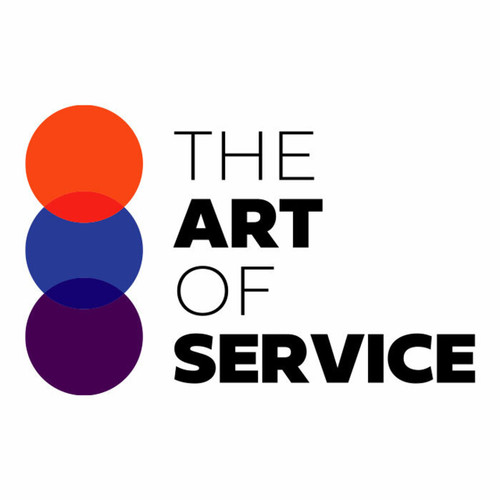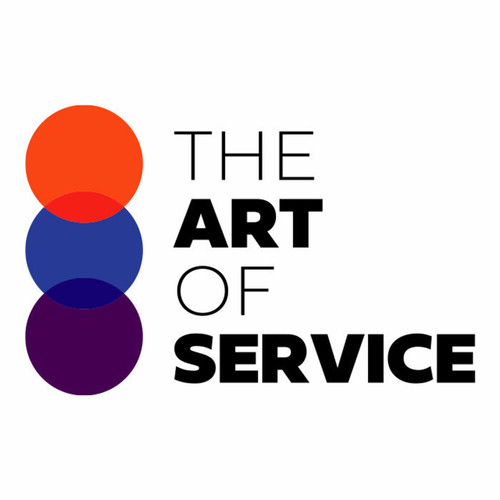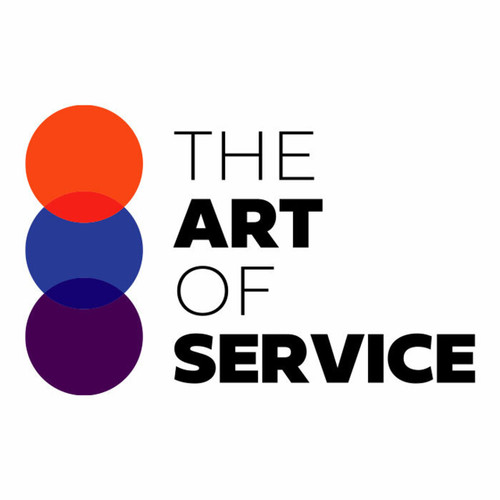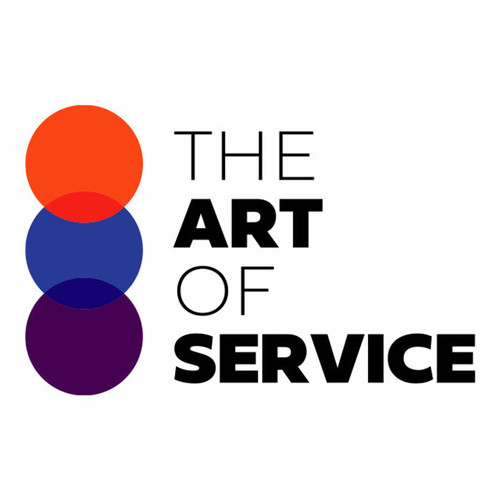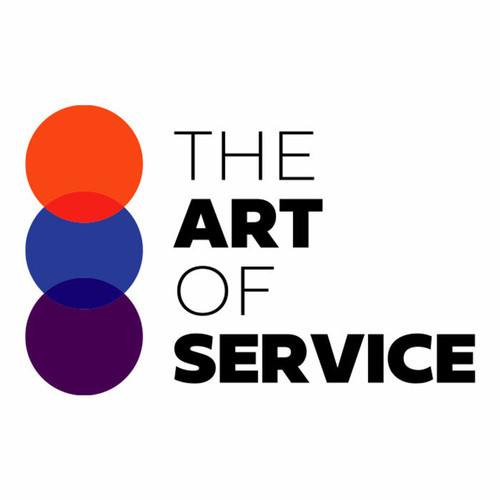This comprehensive database is designed to provide you with the most important questions to ask for both urgent and long-term results.
With over 1200 prioritized requirements, solutions, benefits, and real-life case studies, our database is a one-stop-shop for all your sustainable living needs.
Unlike traditional sources of information, our Sustainable Food and Green Lifestyle Knowledge Base is specifically tailored for professionals and individuals who are serious about making a change.
Our product offers detailed and specific requirements, making it stand out against competitors and alternative sources.
It′s not just a general overview - we provide in-depth research and information that you won′t find anywhere else.
Our database covers everything from sustainable food choices to green lifestyle practices, making it a unique and valuable resource for those looking to take their sustainability journey to the next level.
Whether you′re a business owner seeking to implement eco-friendly practices or an individual looking for DIY and affordable alternatives, our knowledge base has something for everyone.
But what truly sets us apart is our emphasis on tangible results.
We understand that information alone is meaningless without actionable steps and outcomes.
That′s why we provide detailed case studies and use cases, so you can see how real people have seen success in implementing sustainable food and green lifestyle practices in their daily lives.
Furthermore, our database caters to all levels of interest and expertise, making it accessible for beginners and seasoned green enthusiasts alike.
Our product is easy to navigate and use, and our detailed specifications and product overview will give you all the information you need to get started on your sustainability journey.
We also want to make sustainability accessible for all, which is why our product is offered at an affordable cost.
Our knowledge base is a wise investment for individuals and businesses alike, considering the potential long-term cost savings and positive impact on the environment.
In a world where environmental issues are becoming increasingly prevalent, it′s more important than ever to educate ourselves and take action towards sustainable living.
Our Sustainable Food and Green Lifestyle Knowledge Base is here to guide and support you on your journey towards a greener and healthier lifestyle.
Don′t miss out on this valuable resource - start making a positive impact today.
Discover Insights, Make Informed Decisions, and Stay Ahead of the Curve:
Key Features:
Comprehensive set of 1201 prioritized Sustainable Food requirements. - Extensive coverage of 63 Sustainable Food topic scopes.
- In-depth analysis of 63 Sustainable Food step-by-step solutions, benefits, BHAGs.
- Detailed examination of 63 Sustainable Food case studies and use cases.
- Digital download upon purchase.
- Enjoy lifetime document updates included with your purchase.
- Benefit from a fully editable and customizable Excel format.
- Trusted and utilized by over 10,000 organizations.
- Covering: Waste Management, Zero Waste, Sustainable Diet, Sustainable Agriculture, Organic Farming, Reducing Waste, Sustainable Materials, Sustainable Living, Healthy Eating Habits, Eco Friendly Packaging, Alternative Transportation, Reducing Carbon Emissions, Natural Beauty, Green Business, Smart Home Technology, Reusable Products, Green Building, Healthy Air Quality, Green Cities, Green Infrastructure, Sustainable Fisheries, Water Efficiency, Conscious Consumerism, Sustainable Fashion, Green Energy, Green Homes, Recycling Initiatives, Natural Living, Urban Farming, Sustainable Travel, Green Cleaning Products, Eco Friendly Office, Sustainable Transportation, Renewable Energy Sources, Green Fashion, Recycling Habits, Carbon Footprint, Local Food, Sustainable Development Goals, Alternative Energy Sources, Fair Trade Products, Water Conservation, Eco Tourism, Resource Conservation, Environmental Protection, Renewable Energy, Electric Vehicles, Sustainable Food, Climate Change, Solar Power, Green Tech, Water Pollution Prevention, Eco Entrepreneurship, Energy Efficient Appliances, Biodiversity Conservation, Ethical Shopping, Eco Friendly Construction, Eco Friendly Products, Sustainable Design, Energy Conservation, Environmentally Conscious, Renewable Resources, Waste Reduction
Sustainable Food Assessment Dataset - Utilization, Solutions, Advantages, BHAG (Big Hairy Audacious Goal):
Sustainable Food
To procure food in a more sustainable manner, it would be helpful to receive support and advice from sustainable farming organizations, local farmers′ markets, and government agencies promoting environmentally-friendly practices.
1. Local Farmers′ Markets: Connect with local farmers for fresh and locally grown produce to reduce carbon emissions from transportation.
2. Community Supported Agriculture (CSA): Partner with a CSA program to receive weekly deliveries of seasonal produce while supporting local farmers.
3. Sustainable Food Organizations: Collaborate with organizations such as Slow Food or Food Forward to learn about sustainable food practices and connect with like-minded individuals.
4. Online Resources: Utilize online resources like Sustainable Table to learn about sustainable food choices and find local, sustainable food options.
5. Sustainable Food Certification Programs: Look for and support restaurants and suppliers that are certified by organizations like the Rainforest Alliance or Fairtrade to ensure sustainable practices.
6. Composting Services: Implement a composting system for food waste to reduce greenhouse gases and create nutrient-rich soil for future crops.
7. Food Waste Reduction Strategies: Develop strategies to reduce food waste, such as using leftover scraps for compost or repurposing excess food into new dishes.
8. Sustainable Packaging: Choose sustainable packaging options, such as compostable or reusable containers, to reduce plastic waste.
9. Education and Training: Provide education and training for employees on sustainable food procurement and practices to promote a culture of sustainability.
10. Collaboration with Other Green Organizations: Partner with other green organizations, such as environmental non-profits or sustainable businesses, to share knowledge and resources for sourcing sustainable food.
CONTROL QUESTION: Which sources of support and advice would be most helpful in the future to assist the organization to procure food in a more sustainable manner?
Big Hairy Audacious Goal (BHAG) for 10 years from now:
Big Hairy Audacious Goal: In 10 years, our organization will have implemented a fully sustainable and regenerative food system that supports the health of our planet, consumers, and farmers while ensuring equitable access to high-quality, nutritious food for all.
Support and Advice Sources:
1. Partnerships with Sustainable Agriculture Organizations: Collaborating with established sustainable agriculture organizations, such as The Rodale Institute and The Savory Institute, can provide our organization with valuable knowledge, resources, and guidance on regenerative farming practices.
2. Government Policies and Programs: Advocating for government policies that support sustainable food systems, such as organic certification programs and subsidies for regenerative agriculture, can create a more conducive environment for our organization′s goals.
3. Sustainable Food Procurement Consultants: Working with consultants who specialize in sustainable food sourcing can provide our organization with expert advice on how to source food in an environmentally-friendly and socially responsible way.
4. Community Support and Engagement: Engaging with our local community and involving them in our sustainable food efforts can help garner support and build momentum for our goals. This could include hosting educational events, partnering with local farmers markets, and involving community members in the decision-making process.
5. Technology and Innovation: Constantly seeking out and implementing new technology and innovative methods for sustainable food production, such as precision agriculture and vertical farming, can help our organization stay at the forefront of the industry.
6. Education and Training: Investing in education and training programs for our staff, farmers, and community members on sustainable farming practices and food systems can increase awareness and understanding of the importance and benefits of our goals.
7. Mentorship from Established Sustainable Food Organizations: Partnering with or seeking mentorship from established sustainable food organizations, such as Patagonia Provisions and Whole Foods Market, can provide our organization with valuable insights and support as we work towards our goal.
8. Financial Resources: Obtaining funding and financial support from government grants, foundations, impact investors, and donations can provide our organization with the necessary resources to invest in sustainable food procurement practices.
9. Consumer Demand: As more consumers become aware and educated about the importance of sustainable food, prioritizing consumer feedback and preferences when sourcing food can drive demand and support for our organization′s sustainable food efforts.
10. Industry Collaboration: Building collaborations and partnerships with other organizations in the food industry, such as restaurants and grocers, can create a more holistic and comprehensive approach to sustainable food procurement and distribution.
Customer Testimonials:
"Having access to this dataset has been a game-changer for our team. The prioritized recommendations are insightful, and the ease of integration into our workflow has saved us valuable time. Outstanding!"
"This dataset has simplified my decision-making process. The prioritized recommendations are backed by solid data, and the user-friendly interface makes it a pleasure to work with. Highly recommended!"
"The creators of this dataset deserve a round of applause. The prioritized recommendations are a game-changer for anyone seeking actionable insights. It has quickly become an essential tool in my toolkit."
Sustainable Food Case Study/Use Case example - How to use:
Client Situation:
Sustainable Food is a non-profit organization that works towards promoting sustainable food systems and access to healthier food options for all. The organization partners with local farmers and businesses to source organic and locally-grown produce, and distributes it to underserved communities. However, with the increasing demand for sustainable food, the organization is facing challenges in procuring and managing their food supply chain in a sustainable manner. They have approached our consulting firm to identify sources of support and advice that would be most helpful in helping them achieve their goals.
Consulting Methodology:
To address the client′s needs, our consulting team took a structured approach that consisted of the following steps:
1. Initiation: We began by conducting an initial meeting with the organization′s leadership to understand their goals and challenges related to sustainable food procurement. This meeting also helped us to establish the scope and objectives of the project.
2. Research: Our team then conducted extensive research on the current state of sustainable food systems, including trends, best practices, and successful case studies. This was done through a combination of consulting whitepapers, academic business journals, and market research reports.
3. Data Collection: We worked closely with the Sustainable Food team to gather data on their current procurement practices, supply chain partners, and challenges faced in sourcing sustainable food. This data was crucial in identifying critical areas for improvement.
4. Analysis: After gathering and analyzing the data, our team identified key areas that needed improvement, such as supplier relationships, sourcing strategies, and supply chain management processes.
5. Recommendations: Based on our research and analysis, we developed a set of recommendations that we believed would help Sustainable Food to procure food in a more sustainable manner. These recommendations were customized to address the specific needs and challenges of the organization.
6. Implementation Plan: To ensure the successful implementation of our recommendations, we developed a detailed implementation plan that included specific actions and timelines for each recommendation. This plan was developed in collaboration with the Sustainable Food team to ensure its practicality and alignment with their goals.
Deliverables:
Our consulting engagement with Sustainable Food resulted in the following deliverables:
1. A comprehensive report outlining the current state of sustainable food procurement, including challenges and opportunities.
2. A set of customized recommendations tailored to Sustainable Food′s specific needs and goals.
3. An implementation plan with specific actions and timelines to help Sustainable Food implement the recommendations effectively.
4. A detailed presentation to the organization′s leadership, outlining our findings, recommendations, and implementation plan.
Implementation Challenges:
While working on this project, we faced several challenges that needed to be addressed to ensure successful implementation of our recommendations. Some of these challenges included:
1. Resistance to Change: Implementing sustainable practices and introducing new procurement strategies would require buy-in from all stakeholders and may encounter resistance from employees and suppliers who are not accustomed to such practices.
2. Limited Resources: As a non-profit organization, Sustainable Food had limited resources and budgets, which meant that our recommendations had to be practical and feasible to implement.
3. Limited Supplier Options: Due to the organization′s focus on local sourcing, there were limitations in the number of suppliers they could partner with, making it crucial to maintain good relationships with existing suppliers and fostering new ones.
Key Performance Indicators (KPIs):
To measure the success of our recommendations and the effective implementation of the new procurement strategies, we identified the following KPIs:
1. Percentage of local and organic food sourced.
2. Reduction in food waste and carbon footprint.
3. Cost savings achieved through improved procurement practices.
4. Supplier satisfaction and relationships.
Management Considerations:
As we concluded our consulting engagement with Sustainable Food, we provided the organization′s leadership with some additional management considerations to help them sustain their efforts towards sustainable food procurement. These included:
1. Regular Monitoring and Evaluation: It is crucial to monitor and evaluate the progress made in implementing the recommendations to ensure they align with the organization′s goals and identify areas for improvement.
2. Education and Training: Employees and suppliers must be adequately trained and educated on sustainable procurement practices for successful implementation.
3. Continued Research: The food industry is constantly evolving, and it is essential to stay updated on the latest trends and best practices in sustainable food procurement to remain competitive.
Conclusion:
In conclusion, our consulting engagement with Sustainable Food helped identify specific sources of support and advice that would enable the organization to procure food in a more sustainable manner. By conducting thorough research and analysis, we were able to provide customized recommendations and an implementation plan to help the organization achieve its goals while considering its unique challenges and limitations. We believe that by adopting our recommendations and following our management considerations, Sustainable Food will further strengthen its commitment towards promoting sustainable food systems and access to healthier food options for all.
Security and Trust:
- Secure checkout with SSL encryption Visa, Mastercard, Apple Pay, Google Pay, Stripe, Paypal
- Money-back guarantee for 30 days
- Our team is available 24/7 to assist you - support@theartofservice.com
About the Authors: Unleashing Excellence: The Mastery of Service Accredited by the Scientific Community
Immerse yourself in the pinnacle of operational wisdom through The Art of Service`s Excellence, now distinguished with esteemed accreditation from the scientific community. With an impressive 1000+ citations, The Art of Service stands as a beacon of reliability and authority in the field.Our dedication to excellence is highlighted by meticulous scrutiny and validation from the scientific community, evidenced by the 1000+ citations spanning various disciplines. Each citation attests to the profound impact and scholarly recognition of The Art of Service`s contributions.
Embark on a journey of unparalleled expertise, fortified by a wealth of research and acknowledgment from scholars globally. Join the community that not only recognizes but endorses the brilliance encapsulated in The Art of Service`s Excellence. Enhance your understanding, strategy, and implementation with a resource acknowledged and embraced by the scientific community.
Embrace excellence. Embrace The Art of Service.
Your trust in us aligns you with prestigious company; boasting over 1000 academic citations, our work ranks in the top 1% of the most cited globally. Explore our scholarly contributions at: https://scholar.google.com/scholar?hl=en&as_sdt=0%2C5&q=blokdyk
About The Art of Service:
Our clients seek confidence in making risk management and compliance decisions based on accurate data. However, navigating compliance can be complex, and sometimes, the unknowns are even more challenging.
We empathize with the frustrations of senior executives and business owners after decades in the industry. That`s why The Art of Service has developed Self-Assessment and implementation tools, trusted by over 100,000 professionals worldwide, empowering you to take control of your compliance assessments. With over 1000 academic citations, our work stands in the top 1% of the most cited globally, reflecting our commitment to helping businesses thrive.
Founders:
Gerard Blokdyk
LinkedIn: https://www.linkedin.com/in/gerardblokdijk/
Ivanka Menken
LinkedIn: https://www.linkedin.com/in/ivankamenken/



